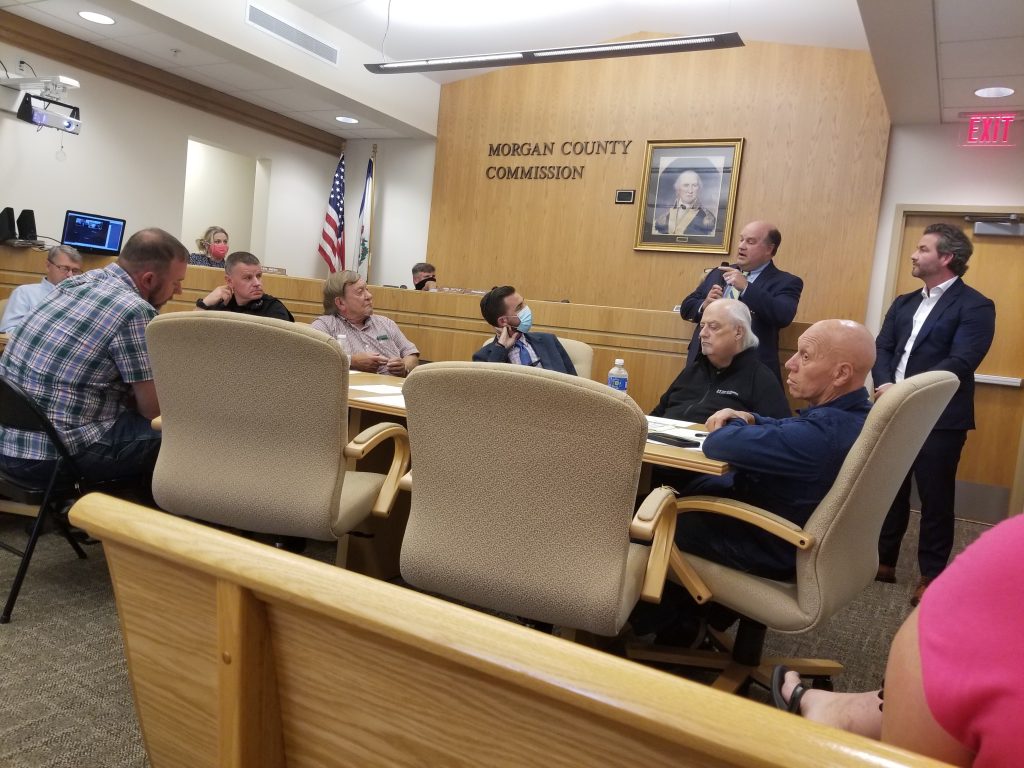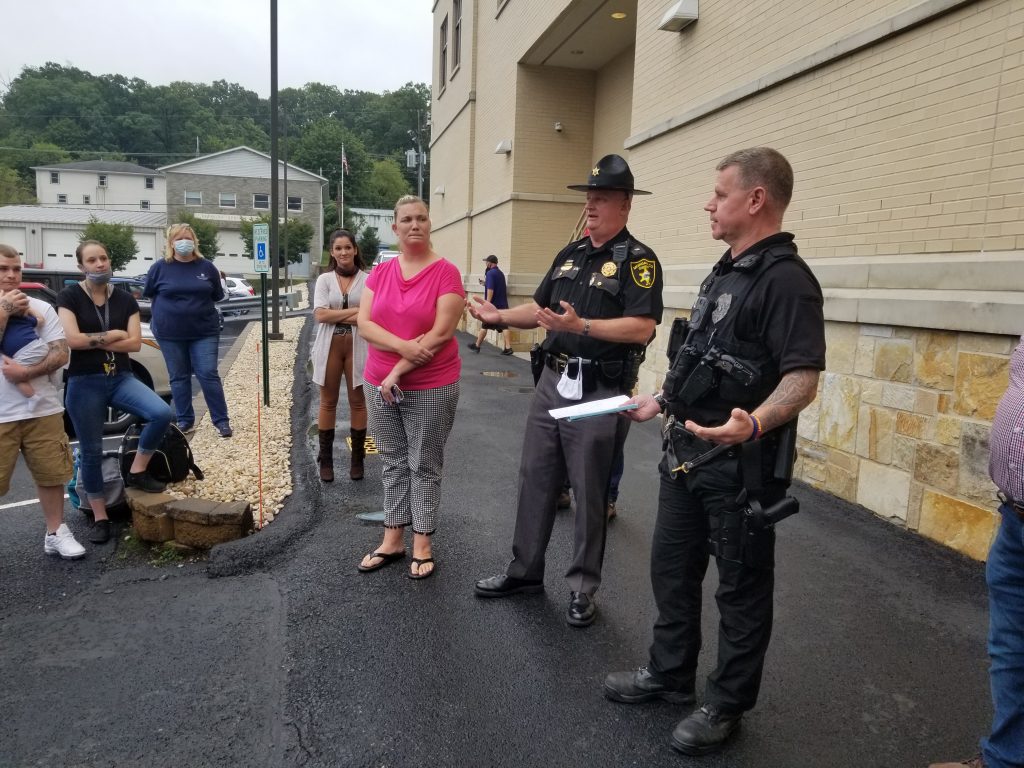The Morgan County Economic Development Authority (EDA) has accepted a letter of intent to purchase the Old Bath High School property on Green Street in Berkeley Springs from the a new privately held corporation, the Lotus Healthcare Group of Wilmington, Delaware, to build a residential substance abuse treatment center. The vote was overwhelmingly in favor. Only realtor Ryan Rebant voted no.
The letter of intent and the agreed purchase price were not made public. The letter gives both parties one month to conduct due diligence – the EDA on Lotus Healthcare and Lotus Healthcare on the property. It’s a non binding letter of intent. It’s not a contract for sale of the property.
The President of Lotus Healthcare, Greg Warren, and the Vice President, David Stup, appeared inside the Morgan County Commission room this afternoon to address the EDA in a public session.
There were about thirty-five people in the room.
After a few minutes of discussion, Angela Gray, the nursing director of the Morgan and Berkeley County Health Departments, walked out of the meeting, warning the EDA members on her way out that if any of them became Covid-19 positive, all of them would have to quarantine.
A few minutes later, after discussing the matter with Gray and deputy health officer Kevin McLaughlin, County Commissioner Sean Forney said the meeting would be moved outside.
“Because of the large number of people in this room, we are going to move the meeting to the back parking lot,” Forney said. “And if you have a face mask, we encourage you to wear it.”
As people were walking out, Forney said “we’re only allowed to have ten people in this room.”
“Says who?” shot back Commissioner Joel Tuttle. “Who says we are only allowed to have ten people in this room?”
“The Health Department,” someone answered.
McLaughlin said the room was more than half full.
“For safety reasons, my recommendation was to do it outside,” McLaughlin said.
“I had one person in the row behind me,” Tuttle said. “Two people in my row.”
“There were 35 people in that room,” Gray told Tuttle. “You haven’t talked to the 800 people (cases with confirmed Covid-19 in Morgan and Berkeley Counties) I’ve talked with.”
The rest of the meeting was held in the County Commission parking lot.
“This will not be an outpatient program,” Warren told the meeting. “We will not be prescribing methadone. There will be a seven day detox program, then a 28 day program and then there will be long term treatment – that could be a month or two months or three months. It’s for however long the patient needs it and for however long the insurance company gives you authorization for.”
“What you will see when we open is nothing except a lot of parked cars,” Warren said. “We are going to have an enclosed wooden fence with a top to it that will allow people to smoke outside without being seen. So truly, you will never know how many patients we have inside that building.”
“Our building is going to be heavily secure. We are going to have 30 to 40 maybe more cameras completely around the building. If you go up the driveway, motion detector lights will turn on. It will be a 24 hour facility. We’re going to have lots of people continually roaming the hallways, checking to make sure our clients are doing okay as they sleep in their beds.”
Warren said that he has spent his entire life in the field of substance abuse.
“I was Baltimore’s drug czar. I was also director of the substance abuse program for the Maryland prison system.”
“In my life, I have opened residential treatment programs in rural settings, suburban settings and behind bars,” Warren said.
Warren said that the facility will deliver 57 full-time positions with an average salary of $55,000.
Warren said that he’s estimating that the facility will hold 80 beds, but he said it’s hard to estimate because part of the third floor is virtually destroyed and will have to be rebuilt.
In the parking lot, there were many questions from the public in attendance. It appeared as if the majority of those in attendance were in favor of the substance abuse center at the Green Street location. Many of those in attendance were recovering addicts.
One person asked if residents of the facility can come and go.
“Yes they can,” Warren answered. “This is not a locked facility. But we will have cameras. People will be monitored all the time. . . .But this is a medical facility where people will only leave for medical reasons.”
EDA board member Susan Webster asked if the 80 beds that they will be filling – are they people from the local area or are they from across the state or from different states?
“I would anticipate that the vast majority of the people coming would be from the Eastern Panhandle,” Stup said. “There are plenty of patients right here that we can see. If somebody wants to come and see us from Fairmont, we will have them.”
Will you accept West Virginia Medicaid?
“Yes that is primarily what we will accept,” Stup said.
Are you going to accept people who don’t have insurance?
“That’s a tough question,” Stup said. “We expect to be able to help people get onto Medicaid. We are going to help people fill out the forms and get them enrolled. They might come in without insurance and then hopefully gain insurance.”
Articles in the industry trade press report that private equity funds are setting up these new corporations to gain a quick profit from the opioid addiction problem.
Who is funding Lotus Healthcare?
“It’s privately funded by our principals,” Stup said.
Who are the principals?
“They are private citizens.”
Are they on your website?
“I’m not sure,” Stup said. “You are asking questions you wouldn’t necessarily ask of other businesses.”
“You are asking for financial information and who the individuals are who are backing us,” Warren said. “We are going to give the County Commission everything. That is their right to get. It’s not necessary for us to tell that to private people.”
A quick search could not find a website for Lotus Healthcare, which was incorporated in July in Delaware. But the search did turn up a press release from a non profit called the Disability Opportunity Fund, with board members including Paypal director Edward Gallagher, LaRue Gibson of LRG Wealth Advisors, and Red Capital Group director E. Edward Greene.
The fund reported that it was loaning Lotus Healthcare $2,000,000 to open four new drug addiction centers in Maryland, Delaware and West Virginia.
EDA board member Kris Domich was concerned about security at the facility.
“People can get up and just leave the facility,” Domich said. “There is no way to guarantee that people won’t get up and leave. And we know that people do get frustrated in rehab and they walk out. People coming into a rehab facility are usually coming in in a very degraded state – spiritually, psychologically, physically. That first 72 hours is some of the most critical time you can spend with the patient. My concern and the concerns others have shared with me is that one day COVID is going to be gone and kids are going to be in the neighborhood walking back from school. What kind of temptations and what kind of opportunities are we introducing with this facility?”
“Would you rather have them in a secure building or standing down here at the end of the street?” someone asked Domich.
Both Morgan County Sheriff KC Bohrer and Bath Police Chief Tony Link spoke in favor of the facility.
Bohrer said he attended elementary school in the Green Street building and is happy to see it will be renovated.
“I’m excited about this because for years, we haven’t had a lot of resources to offer our people help,” Bohrer said. “From our discussions, it looks like this is going to be a safe and secure facility. At least there is a chance the people are going to get well.”
Link said that he’s in favor of the facility.
“If we don’t do it, as a community I think we need our heads examined,” Link said. “We lock the drug dealers up. But there are so many people that aren’t the dealers that need the help. It’s about time we step up as a community and start doing something. And this is a perfect opportunity.”


